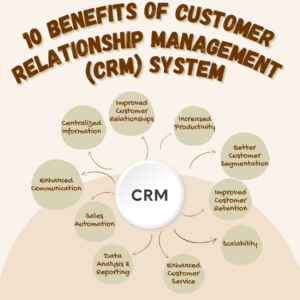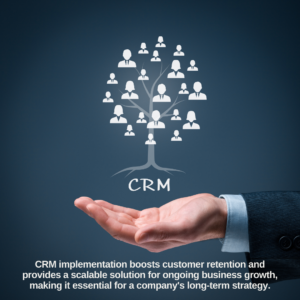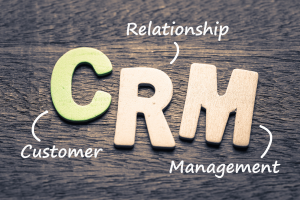Customer Relationship Management: Key to Business Growth and CRM Success
At Boost Customer Retention & Business Services, we understand that effective Customer Relationship Management (CRM) is the cornerstone of sustainable business growth. Our expertise in CRM empowers businesses to enhance customer loyalty, streamline operations, and drive success. By leveraging advanced CRM tools and strategies, we help you build lasting relationships with your customers, ensuring consistent engagement and satisfaction. Discover how our tailored CRM solutions can transform your business today.
What is a CRM?
Customer relationship management (CRM) is a comprehensive system designed to manage a company’s interactions with current and potential customers. At Boost Customer Retention & Business Services, we understand that effective CRM goes beyond simple contact management. It’s about creating a centralized hub for all customer information, which helps businesses streamline processes, enhance customer satisfaction, and ultimately foster growth. Primarily, a CRM facilitates better relationship management by consolidating data from various channels, including emails, calls, social media, and other touchpoints.
The right CRM system enables your business to understand customer needs and behaviour more deeply, allowing for personalized communication and targeted sales strategies. With Boost Customer Retention & Business Services, we emphasize that a powerful customer relationship management tool can help your company build stronger connections. By recording and analyzing every interaction, a CRM allows your team to provide exceptional customer service, resolve issues quickly, and increase overall satisfaction rates.
Moreover, customer relationship management systems come with a broad range of features tailored to enhance efficiency. Key functionalities often include sales automation, marketing automation, customer support, and analytics. These features not only help in managing tasks but also provide invaluable insights into customer trends and behaviors. For example, through automation, repetitive processes are handled seamlessly, freeing up your team to focus on driving growth and enhancing customer relationships further. When integrated with data analysis tools, CRMs can offer actionable insights, which are vital for strategic decision-making and boosting business performance.
At Boost Customer Retention & Business Services, we recognize that the value of customer relationship management extends to all aspects of a company’s operations. From nurturing leads and converting them into loyal customers to maintaining long-term relationships, a well-implemented CRM system is invaluable. It’s essential for relationship management, enabling your company to maintain a clear and organized view of customer interactions, sales, and support efforts. This consolidated approach ensures that every team member is on the same page, leading to consistent and high-quality customer experiences.
In summary, a customer relationship management system is not just a tool but a strategy that transforms how a company engages with its customer base. By centralizing all customer-related information, it widens the scope of management, making it easier to anticipate customer needs and deliver personalized experiences. Boost Customer Retention & Business Services is committed to helping your business leverage the full potential of CRM systems for sustainable growth. With the right CRM, your business can turn data into insights, insights into actions, and actions into enhanced customer satisfaction and business growth.
Benefits of a CRM System
In today’s competitive business landscape, leveraging a CRM system is paramount for customer relationship management, driving business growth, and achieving CRM success. A carefully implemented CRM strategy offers numerous advantages, allowing businesses to effectively manage their data, streamline processes, and enhance interactions with their customers. One of the primary benefits of a CRM is the centralization of data, which grants businesses instant access to customer information, histories, and preferences. This, in turn, empowers teams to deliver personalized experiences, increasing customer satisfaction and loyalty.
By capturing, storing, and analyzing data, companies can make well-informed decisions that propel business growth. The ability to swiftly aggregate customer data ensures that your strategy is based on accurate insights, rather than assumptions. Furthermore, an effective CRM strategy facilitates seamless communication across various departments, ensuring that everyone is on the same page and can collaborate more effectively. This unified approach not only improves internal operations but also enhances customer communication, fostering a more consistent and professional brand image.
Another significant benefit of a CRM system is its role in identifying and capitalizing on new business opportunities. By analyzing data and recognizing patterns, businesses can tailor their strategies to better meet the evolving needs of their customers. This proactive approach helps in retaining existing customers while attracting new ones, driving exponential business growth. Additionally, CRMs typically include features that automate routine tasks, freeing up valuable time for employees to focus on more strategic initiatives. Automation of marketing campaigns, follow-ups, and customer service processes lead to increased efficiency and productivity.
Data security is another crucial aspect provided by CRM systems. With robust data protection protocols in place, businesses can ensure that customer information remains safe and secure, fostering trust and credibility. Moreover, modern CRMs offer detailed analytics and reporting tools that provide valuable insights into customer behaviour and market trends. These data-driven insights enable businesses to continuously refine their strategies, ensuring sustained growth and a competitive edge in the marketplace.
Customer relationship management is not just about maintaining data; it is about fostering meaningful relationships with your customers. By leveraging a CRM system, companies can understand and anticipate customer needs, delivering a level of service that exceeds expectations. This commitment to exceptional customer service translates into increased customer loyalty, longer retention periods, and ultimately, significant business growth. Partner with Boost Customer Retention & Business Services to implement a CRM strategy that aligns with your business goals and drives customer relationship excellence.
Benefits of Customer Relationship Management (CRM) System:

- Improved Customer Relationships: A CRM system helps you manage your customer interactions more effectively, ensuring better satisfaction and loyalty.
- Centralized Information: Store all customer-related data in one place, accessible to all team members, ensuring everyone is on the same page.
- Enhanced Communication: Efficiently track and manage customer interactions, enabling more meaningful and timely communication.
- Sales Automation: Streamline sales processes, from lead generation to closing deals, allowing sales teams to focus on their primary tasks.
- Data Analysis and Reporting: Gain insights from customer data through detailed analytics and reports, helping in strategic decision-making.
- Increased Productivity: Automate repetitive tasks and workflows, freeing up time for more critical activities and improving overall efficiency.
- Better Customer Segmentation: Segment your customer base more effectively with detailed data, enabling targeted marketing and personalized service.
- Improved Customer Retention: Analyze customer behaviour and preferences to anticipate needs and improve customer retention strategies.
- Scalability: CRM systems can grow with your business, accommodating more users and customer data without compromising performance.
- Enhanced Customer Service: Provide timely and efficient customer support with quick access to customer history and interaction records.
A 24/7 Digital Hub for Your Business
In today’s dynamic business landscape, having a digitally optimized and always accessible platform is no longer a luxury, but a necessity. A 24/7 Digital Hub for Your Business is a critical component for driving key business outcomes and ensuring long-term growth. A well-implemented CRM system facilitates this by functioning as a comprehensive digital hub where all aspects of customer relationship management converge.
Your CRM system should be designed to not only track and manage interactions with existing customers but also to anticipate the needs of potential customers. By doing so, it supports a robust business strategy that can adapt to fluctuating demands and opportunities. The development of such a system is integral to the business management process and can significantly impact the efficiency of your operations.
Imagine a scenario where every touchpoint with your customers is seamlessly logged and easily accessible to your team members at any time, from any place. This 24/7 availability ensures that your business never misses an opportunity to engage with a customer or respond to their needs. The ability to provide immediate feedback and maintain continuous communication can be the difference between retaining a customer or losing them to a competitor.
Moreover, the integration of analytical tools within your CRM system enables data-driven decisions, helping you to refine your business strategy and improve customer satisfaction. Building and maintaining strong customer relationships are paramount, and having a digital hub that operates around the clock makes this task more manageable. Your CRM system becomes the epicenter of customer relationship management, encompassing everything from marketing automation to service and support, thereby creating a cohesive ecosystem where the focus is squarely on the customer.
Being able to access critical customer information in real-time empowers your team to provide better service, anticipate issues before they escalate, and personalize interactions to foster loyalty. This level of responsiveness is key to achieving business growth and enhancing CRM success. Developing a digital hub through your CRM system aligns all customer-centric activities and ensures they support the broader business goals.
For businesses aiming to grow and thrive in a competitive marketplace, embracing a 24/7 digital hub is not just an option—it’s a strategic imperative. By leveraging your CRM system as a central management tool, you ensure that every customer interaction is optimized for maximum value. In doing so, you not only cement the relationship with existing customers but also create a fertile ground for acquiring new ones.
At Boost Customer Retention & Business Services, we understand the importance of reliable, round-the-clock digital hubs in customer relationship management. Let’s collaboratively build a CRM strategy that not only meets your business needs but also propels you towards unprecedented business growth.
How to Implement a CRM for Business Growth
Effective customer relationship management is pivotal to achieving sustained business growth. Implementing a CRM system involves a strategic approach that integrates various facets of management, from collecting and analyzing data to enhancing customer interactions. The first step in adopting a CRM for your company is identifying the needs and goals specific to your business. This ensures that the selected CRM solution aligns with your overall strategy and objectives, focusing on targeted growth metrics.
Once the needs are identified, the next phase is selecting the CRM system that best fits your company’s requirements. Whether it’s a cloud-based platform or an on-premises solution, the CRM should offer the necessary features for scalability and flexibility. Evaluating the tools for data handling, customer interaction tracking, and reporting capabilities will help in making an informed choice. It’s crucial to consider how the system integrates with existing customer data and business processes to ensure a seamless implementation.
Integration is a significant aspect of a successful CRM strategy. A well-integrated CRM allows for the comprehensive collection and analysis of customer data, which is vital for formulating effective marketing campaigns and personalized communication strategies. Proper integration enhances the CRM’s utility by aligning it with other critical business systems, such as ERP and customer service platforms, thereby providing a holistic view of customer interactions. This 360-degree view is instrumental in driving customer satisfaction and loyalty.
Training your staff is fundamental to the successful implementation of a CRM. Ensuring that your team understands how to leverage the system’s features will maximize its potential and lead to more efficient processes. Training should focus on data entry accuracy, usage of analytical tools, and understanding customer behaviours. Regular training updates will keep your team adept with the latest CRM functionalities and trends, fostering a culture of continuous improvement.
Another critical step is to continuously monitor and evaluate the CRM system’s performance against set business objectives. This involves regularly analyzing the data collected by the CRM to identify trends, measure customer satisfaction, and evaluate the effectiveness of targeted marketing strategies. By doing so, businesses can make data-driven decisions that boost growth and refine their customer relationship management approach.
In summary, implementing a CRM system for business growth involves careful planning, selecting the right tools, ensuring seamless integration, providing thorough training, and continuous performance evaluation. By following these steps, companies can enhance their CRM strategy, effectively utilize customer data, and achieve sustained growth. At Boost Customer Retention & Business Services, we specialize in helping businesses leverage the power of CRM for remarkable improvements in customer relationships and overall business performance.
Key Features of Customer Relationship Management
In today’s competitive landscape, effective customer relationship management is crucial for any company’s success. At Boost Customer Retention & Business Services, we understand that managing customer data efficiently can drive business growth and ensure CRM success. One of the key features of implementing a CRM system is its ability to centralize all customer data. With a consolidated database, companies can access valuable customer information at any time, facilitating better decision-making and personalized customer interactions. This centralized management of data means your team can focus on building stronger relationships with customers rather than wasting time searching for scattered information.
Another standout feature of CRM systems is their capability to automate repetitive tasks. This automation not only streamlines sales and marketing processes but also ensures consistency in customer interactions. Automated workflows allow your team to maintain a high level of service, ensuring customers’ needs are promptly addressed. In turn, this improves overall customer satisfaction and retention rates, which are vital for sustained business growth.
Integration is another crucial aspect of customer relationship management. A well-integrated CRM system enables seamless communication between various departments within the company. This holistic approach ensures that everyone is on the same page regarding customer interactions and status updates. For instance, sales teams can instantly access information on a customer’s previous purchases or interactions, allowing them to offer more personalized and effective solutions. Such integration bridges gaps within the organization’s operational framework, promoting efficiency and unity.
Moreover, CRMs offer robust analytical tools that provide insights into customer behaviours and preferences. By leveraging this data, companies can develop targeted marketing campaigns and tailor their product offerings to meet specific customer needs. These insights also empower businesses to anticipate customer demands, leading to proactive rather than reactive customer service strategies. The analytical capabilities of modern CRM systems are key to unlocking valuable trends and patterns that can drive strategic business decisions.
Customer relationship management systems also play a pivotal role in improving customer engagement. With features like email marketing, social media integration, and customer feedback loops, CRMs provide multiple touchpoints for interacting with customers. These tools enable companies to maintain consistent and meaningful communication with their customer base, fostering long-term loyalty. Additionally, the ability to track customer feedback and satisfaction levels helps companies continuously refine their services and product offerings.
Lastly, security is an integral feature of any CRM system. Ensuring that customer data is stored securely and complies with relevant regulations is non-negotiable. Advanced CRM systems offer robust security measures, including encryption and access controls, to safeguard sensitive customer information. In conclusion, the key features of customer relationship management systems—centralized data, automation, integration, analytics, customer engagement, and security—are instrumental in driving business growth and achieving CRM success.
CRM and Data Integration for Better Decisions
In the modern business landscape, effective customer relationship management (CRM) is paramount for companies aiming to grow and succeed. Data integration plays a pivotal role in this process, enabling organizations to leverage vital information for better decision-making. A well-implemented CRM system allows for the seamless integration of diverse data points from various customer interactions, providing companies with a comprehensive view of their customer base. This holistic approach to data management enhances the CRM’s utility, making it a key component in driving business growth. The integration of data into a CRM system augments the ability to analyze customer behaviours, preferences, and trends. By centralizing this information, businesses can make informed decisions that align more closely with customer needs and expectations. Consequently, the company can tailor its services and offerings more precisely, fostering stronger customer relationships and increasing retention rates.
Companies that harness the power of data integration within their CRM systems often see a marked improvement in their customer relationship metrics. Moreover, CRM systems that incorporate advanced data integration capabilities allow companies to segment their customer base more effectively. This segmentation enables personalized marketing efforts and targeted communication strategies, which are crucial components of maintaining robust customer relationships. The ability to access and analyze detailed customer data makes it easier for businesses to anticipate needs, resolve issues promptly, and create personalized experiences that resonate with their customers.
Data integration within CRM systems also supports better internal communication and coordination. With access to comprehensive customer data, different departments within the company can collaborate more efficiently. For instance, the sales team can utilize CRM data to understand customer history and preferences, while the marketing team can develop campaigns that align with identified trends and behaviours. Better coordination leads to more consistent and positive customer interactions, further strengthening relationships and promoting a favourable company image.
Ultimately, the integration of data into CRM systems is indispensable for companies looking to enhance their customer relationship management efforts. It empowers businesses to make well-informed decisions, improve customer satisfaction, and achieve CRM success. With CRM and data integration, companies can address the dynamic needs of their customers, foster loyalty, and stimulate continuous growth. As businesses increasingly recognize the value of effective CRM and data integration, it becomes evident that this practice is not just beneficial but essential for sustaining strong customer relationships and ensuring long-term success.
How CRM Improves Customer Relationships
Customer Relationship Management (CRM) is a critical strategy that plays a vital role in enhancing how a company interacts with its customers. At Boost Customer Retention & Business Services, we believe that effective CRM is not just a tool but a holistic strategy designed to increase customer satisfaction and loyalty. By utilizing advanced data analytics, a company can gain valuable insights into customer preferences and behaviours, allowing for more personalized and targeted interactions.
The key to successful customer relationship management lies in its ability to centralize all customer-related data. This facilitates a comprehensive view of every customer’s journey with the company, from initial contact to post-purchase support. With streamlined data management, companies can ensure that customer service representatives have immediate access to all relevant information, which significantly improves response times and the quality of service provided. It’s no surprise that businesses adopting CRM strategies often see a noticeable increase in customer retention rates.
Furthermore, CRM platforms enable businesses to segment their customer base, allowing for tailored marketing efforts that resonate more deeply with specific groups. This segmentation strategy is crucial for delivering targeted promotions, special offers, and personalized content, effectively increasing customer engagement. When customers feel understood and valued, they’re more likely to remain loyal to the brand, which is a key business outcome.
Another advantage of CRM systems is their ability to automate repetitive tasks, such as follow-up emails, appointment reminders, and feedback requests. Automation not only frees up valuable time for employees to focus on more complex tasks but also ensures consistency in customer interactions. This consistency helps build trust and reliability, cornerstone elements of a strong customer relationship.
At Boost Customer Retention & Business Services, we advocate for the integration of CRM with other business tools to amplify its impact. For instance, integrating CRM with marketing automation software can yield a powerful strategy for managing customer relationships. This holistic approach ensures that all customer touchpoints are aligned, providing a seamless and cohesive experience that drives customer satisfaction and loyalty.
In summary, CRM is an essential strategy for any company looking to foster stronger customer relationships. By leveraging data and implementing comprehensive management practices, businesses can achieve significant improvements in customer satisfaction and loyalty. The implementation of CRM doesn’t just increase customer retention; it also provides a scalable solution for sustained business growth, making it a key component in any company’s long-term strategy.

CRM Tools for Customer Retention
In today’s competitive business environment, leveraging CRM tools is indispensable for enhancing customer relationship management. Effective customer relationship management is critically important in retaining loyal customers and ensuring sustainable business growth. At Boost Customer Retention & Business Services, we understand that a robust CRM system isn’t just a tool for managing data; it’s a comprehensive solution that offers key insights into customer behaviour, preferences, and interaction history. By implementing advanced CRM tools, businesses can streamline their customer relationship management processes to optimize customer retention rates.
These CRM tools are particularly effective in managing vast volumes of data, which is critical for crafting personalized marketing strategies, thereby fostering stronger bonds with customers. The ability to collect and analyze data allows your business to understand your customers better, thereby enabling proactive solutions to potential issues before they escalate. One of the key benefits of using CRM tools for customer relationship management is that they centralize data, making it accessible to all relevant departments. This centralized data repository is critical in ensuring that everyone in your organization can access real-time information that improves customer interactions and service quality. For example, sales teams can use this data to understand a customer‘s purchase history and preferences, thereby tailoring their sales pitch to meet specific needs.
Serving personalized recommendations based on customers‘ past behaviour not only enhances the customer relationship but also increases the likelihood of repeat purchases. Moreover, customer service teams can leverage the consolidated data to offer faster and more efficient resolutions, thereby improving customer satisfaction. By having access to comprehensive customer relationship records, your team can anticipate customers‘ needs and provide exceptional service that positions your business as a leader in customer relationship management.
Additionally, CRM tools come equipped with analytics and reporting capabilities that are indispensable for measuring customer engagement levels, monitoring customer satisfaction scores, and identifying areas for improvement. At Boost Customer Retention & Business Services, we’ve seen firsthand how powerful CRM tools can be in transforming customer relationship management and driving business growth.
Our suite of CRM solutions is designed to not only retain loyal customers but also to turn satisfied customers into brand advocates. In conclusion, adopting the right CRM tools for customer relationship management is not just an option; it’s a critical strategy for achieving long-term business success.
Customer Relationship Management FAQs
Q: What is Customer Relationship Management (CRM) at Boost Customer Retention & Business Services?
A: Customer Relationship Management (CRM) at Boost Customer Retention & Business Services involves a comprehensive system designed to manage a company’s interactions with current and potential customers. Our CRM solutions focus on creating a centralized hub for all customer information to streamline processes, enhance customer satisfaction, and foster sustainable growth.
Q: How does CRM benefit my business?
A: CRM benefits businesses by consolidating data from various channels, enabling personalized communication, targeted sales strategies, and improved customer service. This leads to stronger customer relationships, resolved issues quickly, and increased satisfaction rates, driving overall business success.
Q: What key features are included in your CRM systems?
A: Our CRM systems at Boost Customer Retention & Business Services include sales automation, marketing automation, customer support, and analytics. These features enhance efficiency by automating repetitive tasks and providing actionable insights into customer behaviours, helping businesses make data-driven decisions.
Q: How does CRM integration enhance customer service?
A: CRM integration allows your company to maintain a clear and organized view of customer interactions, sales, and support efforts. This ensures that every team member is on the same page, leading to consistent, high-quality customer experiences and improved internal communication and coordination.
Q: Why is data security important in CRM systems?
A: Data security is crucial because it ensures the protection of sensitive customer information. Our CRM systems include robust security measures like encryption and access controls to safeguard data, fostering trust and credibility with your customers and ensuring compliance







